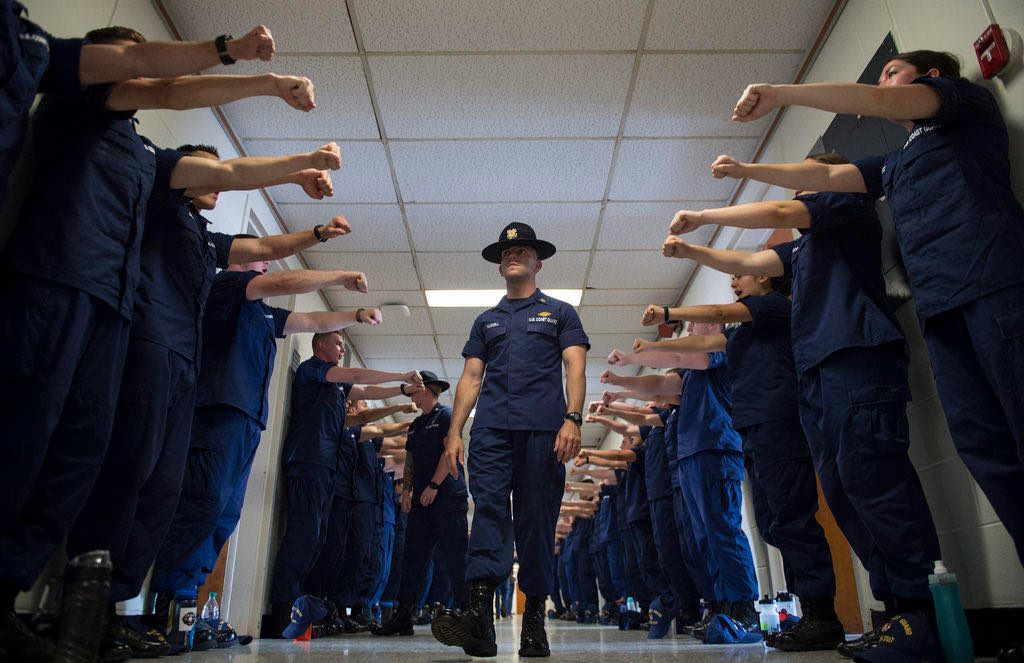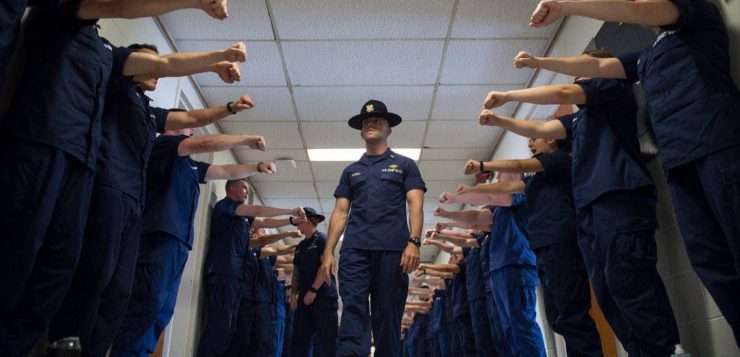
If you were to encounter Carson Russell and his husband walking down the street in downtown Seattle, you’d find yourself in a pleasant exchange with a charming and incredibly engaging man. If you caught him in uniform, you’d likely thank him for his service and disembark with an impression of a proud and polite Coast Guardsman. Carson is all these things and more – he is an deeply intriguing individual, like all of us in the Coast Guard, with countless stories to tell and a sense of self that comes from years in the military. I remembered him instantly after chancing across him on Facebook early in in 2019, and after not having seen him since my own stint in Coast Guard Recruit Training (boot camp), I was delighted when he agreed to sit down with me for a phone interview But when conversing with him for the first time in my knowing him, the person I remember as “Petty Officer Russell!” comes screaming back at me…
“You have fifteen seconds to get off this bus,” Russell shouted, “and you just wasted ten of them! Now move. MOVE! GET OFF MY BUS!”
Those are the first commands fresh-faced Coast Guard recruits hear upon arrival at Basic Recruit Training; they were mine, too. And it was none other than Carson Russell who bellowed them at me as a shaggy-haired teenager one muggy night in May of 2014. Carson was what’s known as a recruit company commander, or drill instructor. During my eight weeks in Cape May, New Jersey, I sweat, marched, and did push ups. I encountered him many times, usually in a sit up position –– a nearly nightly punishment for forgetting to shave that morning. Talking casually on the phone with him now, I can still feel the shadow of his smokey-bear hat as, bellowing ferociously, he instructs me for the first time in my life how to march with a proud, straightened back.
Born in Knoxville, TN and raised in the tiny town of Woodstock, AL, with four siblings and “a lot of time in church,” he lived the provincial, small-town life I am familiar with as a native Southerner. As a gay man navigating life and youth in the humdrum of small-town America, one can only imagine the monotony and the desire for something fresh that led him to enlist in the Coast Guard in 2005 at the age of eighteen. By 2013, he found himself wearing the mythic campaign-hat that is so iconic of military drill instructors in the U.S, becoming the first openly gay man on the Cape May Regiment.
The life of an enlisted Company Commander (CC) is not an easy one. Fifty-two hour work-weeks starting at 3:30 am are typical. Solicitations for the position, which are all voluntary, are highly selective, requiring personal peer and command endorsements from the applying enlisted member. Training is “like boot-camp on steroids” he says, and it is entirely common for the tiny classes of ten to twelve to be whittled down to three or four people. Those who survive earn the privilege of ushering in and molding future coast guardsmen. All recruits remember, till the day they die, the pride and motivation their CCs instill into them. With nine recruit companies under his belt (ranging from classes of eighty to 120), the impact Carson has made on his service and his pupils is something inestimable.
I ask him what drew him to the rigors of such a career path in our Guard, and his response is no different from those of my own CCs. “I enjoy changing lives,” he says matter-of-factly, “and being there for people, helping them become a better human is such an incredible experience.”
I feel the sudden urge to iron all the clothes in my closet.
I enlisted in 2014 as a straight man three years after the repeal of the Don’t Ask, Don’t Tell policy barring openly gay, lesbian and bisexual service members. I had the luxury of simply falling into a military that welcomed and fostered our human kinfolk in the LGBT community. Carson enlisted in 2005. He may have been a proud member of the Coast Guard, but he could not be an open and proud gay man.
“We all definitely had to navigate our lives in the military cautiously,” he remembers. “You had to know who to trust and how to phrase those aspects of your life.”
But Carson still enjoyed his enlistment his early enlistment as he does his current one. “If anything,” he says, “I was motivated to strive forward, and that’s what we did!”
Even though the repeals of the Defense of Marriage Act and Don’t Ask, Don’t Tell were met with discrimination, “the support of the CG community” helped both it’s LGBTQ community and the service as a whole blossom into what it is today.
Serving an openly gay CC is indicative of how far we’ve come in the path to acceptance in our country of LGBT people. His influence on countless coast guardsmen who remember him as a man that whipped them into shape and a new life is a testament to the fact that “gay, straight, man, woman… being yourself is what counts in life and “competence and character is proved through action.” His experience as a gay man in an ever-changing military and America proves that the best way to “navigate the world… is through understanding.”
Carson reminds me to “always give back,” and leaves me with a mirthful, sincere “thank you” that is light years away from the war-cry we departed with five years ago. I think about how, truly, nothing but who we are matters when a person like Russell has impacted as many young people as him. As a way to say “thank you, too,” I reach for my old boots, and begin to polish.
 Jonathan Zepeda is a 24 year old writer and filmmaker from Rio Grande Valley, TX living in Boston, MA.
Jonathan Zepeda is a 24 year old writer and filmmaker from Rio Grande Valley, TX living in Boston, MA.







Discussion1 Comment
Indelibly sketched profile piece on Carson Russell. Vivid, terse writing. Great visual and character descriptions. Loved it.